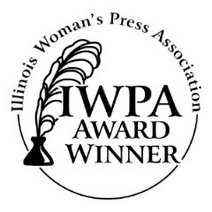 I spend a lot of time urging seniors to write the stories of their lives. I wrote and published mine in 2006. But where did I get the idea? It long ago occurred to me that my mother's unpublished life story, My First Eighty-Six Years: a Midwestern Life, which I edited and had printed for her in 1997, was my main inspiration. She distributed her life story to family and friends and to anyone who expressed the slightest interest; she was still giving copies to the staff at her nursing home a year or two ago, when she was able to communicate (she still clings to life at 95, but just barely). She has had an interesting life, and of course she was one of those people urged to write. I'm glad she did.
I spend a lot of time urging seniors to write the stories of their lives. I wrote and published mine in 2006. But where did I get the idea? It long ago occurred to me that my mother's unpublished life story, My First Eighty-Six Years: a Midwestern Life, which I edited and had printed for her in 1997, was my main inspiration. She distributed her life story to family and friends and to anyone who expressed the slightest interest; she was still giving copies to the staff at her nursing home a year or two ago, when she was able to communicate (she still clings to life at 95, but just barely). She has had an interesting life, and of course she was one of those people urged to write. I'm glad she did.The picture above shows my mother, Violet Marshall Funston, with my brother and me, at her 90th birthday party in 2001. All three of us have changed since then, but my brother (now 72) and I are still active and relatively healthy.
Here are the first five paragraphs of My First Eighty-Six Years. I hope they will encourage other seniors to write their own life stories.
"There was a time when heredity was blamed for whatever was wrong with you. When I was old enough to spell and understand the word 'heredity,' I could only hope that the good, solid, God-fearing Methodists who were my mother's parents would somehow be the stronger influence on my character. As I grew older and wiser, I realized that I was much more like my father's family, and was thankful. They had lots of self-confidence, no fear of giving up a sure thing to try something new. My father taught me I could do anything I wanted to do, and that I should never be afraid to follow my dreams.
"As a child, I spent much time with my father's family and as little time as possible visiting my mother's parents. There was always something happening at my father's home. My father's mother, Harriet Bryant Uhl, was English, and being English, never missed her afternoon tea and cakes. Whenever possible, I joined her. She was short and wide and jolly and could always cure any ache I might have, real or imaginary, by holding me on her ample lap. Then she told me stories of her early married life in Pennsylvania where her eleven children were born, eight boys and three girls, without benefit of a doctor. According to Grandma, child-bearing was a natural process, and a healthy woman should be able to assume her full work load two or three days after childbirth. She didn't think much of the women who used childbirth as an excuse to get a week's vacation.
"One of my favorite stories that I asked Grandma to tell over and over again was about my father. My father had a slight limp, and I never tired of hearing Grandma tell how he got the limp. When he was a small boy, he accompanied Grandma to the woods near Johnstown, Pennsylvania, to pick blackberries. He had his own little bucket and picked and ate blackberries. One day, he became tired and sat down under a tree. A copperhead snake crawled into his lap. It frightened him, he hit at it, and the snake bit him in the ankle. Many miles from a doctor, Grandma sucked the poison out and saved his life. He was sick for many months. He would have been in third grade, but he never attended school after that. His mother taught him. She not only taught him reading, writing, and arithmetic, but in the process taught him religion, kindness, and good work ethics. His greatest wish was that both of his children, my brother and I, get good educations, and we did, in spite of some obstacles.
"According to my Aunt Mary, Grandpa Joseph Uhl taught rural school in Pennsylvania when the eleven children were small, and sat evening after evening at the neighbors' home talking, singing, and playing the violin. Grandma did the work on the farm, including milking, raising pigs, raising chickens, and gardening. She got the help of a neighbor when it was necessary to take a few days off to have her babies. She taught the children to help when they were small. To Grandma, farm work could not be done by an educated person such as Grandpa, especially one who played the violin. I never knew a happier person than Grandma, and she raised a happy, well-adjusted family. Ten of her children were God-fearing Catholics who married well and earned their share of this world's goods. Unfortunately, one son was an alcoholic. His wife divorced him and took the two children, and he came home to live with Grandma and Grandpa. Grandma never got over her one failure in raising a child, always blaming herself. Many a time I heard her ask, 'Where did I fail with George?'
"As I grew older and listened to the champions of women's liberation, I thought of Grandma, always strong, always happy, meeting all her problems head-on. Thinking of Grandma gave me courage. It is always nice to have someone to help you, but if there is no one available, you can do it yourself."
While I can't endorse the "woman as martyr" view expressed here, nor have I ever shared it, I am happy to belong to a line of strong women. Most of all, I am happy to have had a mother who loved to read and write and encouraged me to do the same.
Copyright 1997 by Violet Marshall Funston and 2007 by Marlys Marshall Styne
Photo from John C. Marshall's family collection.


















2 comments:
Hi Marlys,
Thank you for sharing this post and your thoughts in a blog. I truly appreciate it!! :)
Thanks! I enjoy receiving comments on my blogs.
Post a Comment